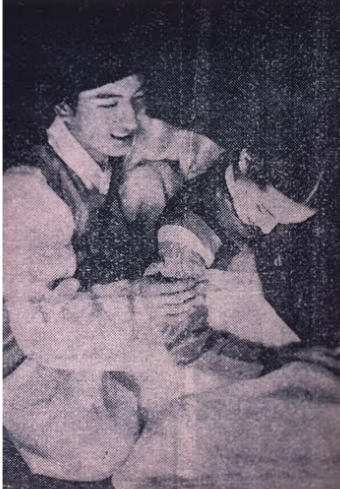Chunhyangjeon (lost Korean sound film; 1935): Difference between revisions
m (Corvene moved page Chunhyangjeon (lost first korean sound film; 1935) to Chunhyangjeon (lost Korean sound film; 1935)) |
No edit summary |
||
| Line 10: | Line 10: | ||
===Summary=== | ===Summary=== | ||
Chun-hyang, the daughter of a geisha in the Namwon region, and Lee Mong-ryong are engaged. When Lee Mong-ryong goes up to Seoul with his father, Byeon Hak-do, the newly appointed magistrate, attempts to take Chun-hyang. Chun-hyang rejects his pleas for her to come serve him and he throws her in jail. Meanwhile, Lee Mong-ryong becomes an undercover detective after placing first on his national exam and goes to Namwon to arrest Byeon Hak-do and rescue Chun-hyang. | Chun-hyang, the daughter of a geisha in the Namwon region, and Lee Mong-ryong are engaged. When Lee Mong-ryong goes up to Seoul with his father, Byeon Hak-do, the newly appointed magistrate, attempts to take Chun-hyang. Chun-hyang rejects his pleas for her to come to serve him and he throws her in jail. Meanwhile, Lee Mong-ryong becomes an undercover detective after placing first on his national exam and goes to Namwon to arrest Byeon Hak-do and rescue Chun-hyang. | ||
===Reception=== | ===Reception=== | ||
The film had been criticized for its technical errors and the cast’s lack of acting skills. The sound technique was reportedly poor because no one knew how to use the machine, they had to resort to post-production dubbing to record the sound. Unlike silent films, they needed sophisticated | The film had been criticized for its technical errors and the cast’s lack of acting skills. The sound technique was reportedly poor because no one knew how to use the machine, they had to resort to post-production dubbing to record the sound. Unlike silent films, they needed sophisticated equipment such as sound-proof cameras, silent lights, and a studio to control external noises but it must have been very difficult in those times. Despite these technical shortcomings, people were amazed by the live video with sound. ''Chunhyangjeon'' became an instant hit and stayed in the theaters for an extended period of time <ref>[https://eng.koreafilm.or.kr/kmdb/trivia/funfacts/BC_0000005063 Korean Film Archive fun facts page on ''Chunhyangjeon''.] Retrieved 24 Mar '20</ref> as Korean audiences appreciated hearing their own language in the cinema. | ||
===Availability=== | ===Availability=== | ||
Revision as of 23:46, 24 March 2020
Chunhyangjeon (The story of Chun-hyang) was released in 1935. It was the first Korean film to have sound added to the motion picture, made by Gyeongseong Productions. The story was adapted from the traditional pansori lyrical opera Chungyangga. During the sound film period, many theaters in Korea competed to screen foreign sound films. However, sound films had not yet been produced in Korea at that time. Accordingly, the release of Chunhyangjeon was a wish come true for many Korean movie lovers. The film is more meaningful as the sound technologies were all domestically developed.[1]
Summary
Chun-hyang, the daughter of a geisha in the Namwon region, and Lee Mong-ryong are engaged. When Lee Mong-ryong goes up to Seoul with his father, Byeon Hak-do, the newly appointed magistrate, attempts to take Chun-hyang. Chun-hyang rejects his pleas for her to come to serve him and he throws her in jail. Meanwhile, Lee Mong-ryong becomes an undercover detective after placing first on his national exam and goes to Namwon to arrest Byeon Hak-do and rescue Chun-hyang.
Reception
The film had been criticized for its technical errors and the cast’s lack of acting skills. The sound technique was reportedly poor because no one knew how to use the machine, they had to resort to post-production dubbing to record the sound. Unlike silent films, they needed sophisticated equipment such as sound-proof cameras, silent lights, and a studio to control external noises but it must have been very difficult in those times. Despite these technical shortcomings, people were amazed by the live video with sound. Chunhyangjeon became an instant hit and stayed in the theaters for an extended period of time [2] as Korean audiences appreciated hearing their own language in the cinema.
Availability
The movie is known to be lost and is more likely simply one of the many Korean films that were lost as a tragic side effect of war. Though a 1941 movie categorized as a pro-Japanese propaganda film Spring of Korean Peninsula, a long scene actually depicts Korean filmmakers shooting the film Chunhyangjeon. Within the movie. It is the only remaining snippet of the Chunhyangjeon movie known to exist to this day.
Gallery
External Link
- IMDb page on Chunhyangjeon. Retrieved 24 Mar '20
References
- ↑ Google Arts & Culture article on Chunhyangjeon. Retrieved 24 Mar '20
- ↑ Korean Film Archive fun facts page on Chunhyangjeon. Retrieved 24 Mar '20


